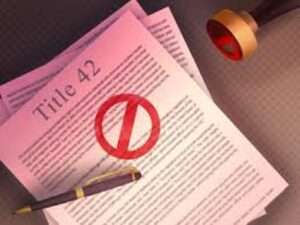The Volokh Conspiracy
Mostly law professors | Sometimes contrarian | Often libertarian | Always independent
My New Article on "Nondelegation Limits on COVID Emergency Powers: Lessons from the Eviction Moratorium and Title 42 Cases"
The eviction moratorium and Title 42 "public health" expulsion cases have many parallels that may have been ignored because of their differing ideological valence. Both strengthen the case for nondeferential judicial review of the exercise of emergency powers.


My forthcoming article "Nondelegation Limits on COVID Emergency Powers: Lessons from the Eviction Moratorium and Title 42 Cases," is now available on SSRN. Here is the abstract:
Two legal battles over Covid pandemic emergency measures highlight the dangers of excessive delegation of emergency power to executive branch agencies: the recently concluded litigation over the Centers for Disease Control nationwide eviction moratorium, and the still-ongoing legal battle over that same agency's Title 42 "public health" expulsions of immigrants. While superficially different, the two legal battles actually raise very similar issues. Both involve exercises of power by the exact same federal agency, utilizing authority it claims was delegated to it under consecutive provisions of the Public Health Service Act of 1944. Both measures were first adopted under the Trump Administration, and later continued—with some modifications—under the Biden Administration. The bipartisan nature of the policies suggests that the problems they raise are not limited to one party, nor to one side of the political spectrum.
Both policies were open to serious challenge under the constitutional nondelegation doctrine, and under the related "major question" doctrine. These vulnerabilities eventually led to the judicial invalidation of the eviction moratorium, and may have contributed to the DC Circuit's partial invalidation of the Title 42 expulsions. Finally, it is notable that both policies caused great harm, while doing little to stop the spread of the disease; both were enacted by the executive despite skepticism from public health experts.
Part I of this article provides an overview of the eviction moratorium and Title 42 policies, and the resulting litigation. In Part II, I explain why both policies violate the constitutional nondelegation principles. Part III shows how, for very similar reasons, both also run afoul of the major question doctrine. Finally, Part IV outlines some lessons that can be gleaned from these cases. Among other things, they strengthen the case for nondeferential judicial review of emergency powers and delegations to supposedly expert executive agencies. They also highlight the need for greater cross-ideological cooperation and dialogue on these issues. Nondelegation and major question limits on emergency powers will be on firmer ground if they enjoy cross-ideological support and cannot be stigmatized as mere partisan tools of one side of the political spectrum.
The article is part of an NYU Journal of Law and Liberty Symposium on "Responding to Emergency: A Blueprint for Liberty in A Time of Crisis" (co-sponsored by the Pacific Legal Foundation). Prof. Steve Vladeck (University of Texas) has posted his own contribution to the same symposium, which critically assesses the Supreme Court's treatment of religious-liberty challenges to Covid-era public health restrictions.
NOTE: I previously authored an amicus brief in the Title 42 case, on behalf of the Cato Institute. The plaintiffs in some of the lawsuits against the eviction moratorium (though not the one the Supreme Court ruled on in August) are represented by the Pacific Legal Foundation, where my wife works (though she herself did not work on these cases). I myself played a minor (unpaid) role in advising PLF on this litigation. For the record, my wife did not play any part in PLF's decision to invite me to participate in this symposium.
Editor's Note: We invite comments and request that they be civil and on-topic. We do not moderate or assume any responsibility for comments, which are owned by the readers who post them. Comments do not represent the views of Reason.com or Reason Foundation. We reserve the right to delete any comment for any reason at any time. Comments may only be edited within 5 minutes of posting. Report abuses.
Please to post comments


The lesson is that government can get away with more or less anything for a year or two if there’s an "emergency". Courts will allow it and help stall for time as needed. And no one will ever be held accountable.
Constitutional amendment:
No emergency declaration shall last more than 14 days, nor cover the same action or behavior as any prior declaration issued in the last year, unless confirmed without alteration by a recorded vote of the legislature.
And while I am dreaming, I would like a pony.
Rather than calling out emergencies as a special case I would tweak the constitution to allow a legislative veto of anything that would be final agency action under the APA.
Ilya Somin's 3rd paragraph - " Finally, it is notable that both policies caused great harm, while doing little to stop the spread of the disease; both were enacted by the executive despite skepticism from public health experts."
Its good to see that people are now recognizing that the mitigation protocols did so little to reduce the spread.
It's good to see that you're as bad at reading blog posts as you are at science.
Let me know when you can point to a single mitigation protocol that actually had a substantive positive effect on the reduction in the risk of transmission.
Let me know when you can point to a single statement that I made that was incorrect - and base that rebuttal on actual empirical evidence - actual evidence based on knowledge that exists as of today, instead of what was perceived as correct 12 months ago which has now been proven wrong.
Joe. David is a lawyer. He may have been an intelligent, ethical lad. After passing 1L, he became one of the stupidest people in the country, with less common sense and more denial than a kid in Life Skills learning to eat with a spoon. Put that kid on the Supreme Court to get an instant upgrade in the quality of the decisions.